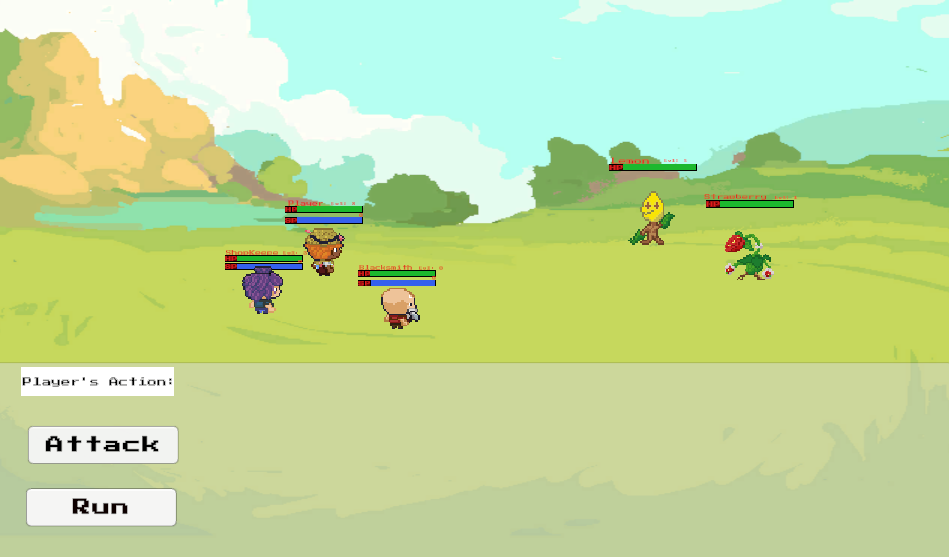Harvest Quest

Project Overview
Harvest Quest is a 2D farming RPG with a unique twist: instead of selling crops, players raise plants and then battle them in turn-based combat to gain profit and loot. The game combines farming simulation with classic RPG combat, creating an innovative gameplay loop of nurturing and then fighting your own creations.
Key Features
- Turn-based combat system with multi-party battles
- Plant enemies generated from player-grown crops
- ScriptableObject-driven modular design
- Custom skill system with SP costs and status effects
- Dynamic UI scaling for multiple party members
My Role & Contributions
I joined this year-long capstone project in the second half, after my original team disbanded. This meant quickly adapting to an already in-progress codebase, identifying weaknesses, and integrating my own systems while maintaining pipeline consistency.
- Combat system rebuild: Expanded the original 1v1 battle into a scalable multi-party turn-based system
- System improvements: Fixed failing or incomplete systems and restructured them for stability
- ScriptableObject architecture: Set up a modular data-driven framework for enemies, skills, and party members
- Combat UI: Built a dynamic interface for multiple entities, including health, SP, and action menus
- Skill & SP logic: Implemented targeting, SP costs, buffs, debuffs, and ally support skills
- Enemy AI targeting: Created functional and expandable logic for enemy decision-making
- Pipeline integration: Improved workflow for teammates by building hooks for animations, audio, and UI
Collaboration & Communication
Team Coordination
A crucial aspect of my role involved extensive communication and coordination with key team members to ensure project success:
- Producer collaboration: Worked closely with the producer to understand their vision and translate it into functional gameplay systems. Created tools and frameworks that allowed them to easily set up gameplay mechanics and level configurations without requiring deep technical knowledge.
- Developer coordination: Maintained constant communication with the other main developer to avoid confusion, prevent code conflicts, and ensure our systems integrated seamlessly. This coordination was essential for maintaining code quality and project momentum.
- Vision implementation: Focused on bringing the producer's creative vision to life through technical implementation, ensuring that the final product matched their intended design and gameplay experience.
- Tool development: Built user-friendly tools and interfaces that empowered non-technical team members to contribute effectively to game content creation and balancing.
Technical Details
Technology Stack
- Engine: Unity (2022.3 LTS)
- Programming Language: C#
- Tools: Unity Animator, ScriptableObjects
- Version Control: GitHub Desktop
- Assets: Custom 2D art/audio + placeholder sprites
Combat System Features
- Multi-party battles with target selection
- SP (Skill Points) cost system
- Status effects and buffs/debuffs
- Single-target, AOE, and support skills
- Dynamic enemy AI decision-making
Team & Development
Team Composition
- 6 students total
- 2 main developers (including me)
- 1 artist
- 1 developer/sound designer
- 1 developer/UI specialist
- 1 producer/designer
Timeline
- Total project duration: ~1 year
- My contribution period: ~4-5 months (second half)
- Capstone course deliverable
- Successfully completed and delivered
Unique Gameplay Loop
Harvest Quest's innovative design creates a compelling cycle:
- Farm & Nurture: Players grow and care for various plant crops
- Transform: Mature plants become unique combat enemies with different abilities
- Battle: Engage in strategic turn-based combat against your own creations
- Profit & Progress: Victory rewards feed back into farming and character growth
Play the Game
Experience the unique farming-to-combat gameplay loop for yourself! Harvest Quest is available to play for free on itch.io.
Play Now on itch.ioKey Achievement
My primary achievement was successfully navigating and improving an inherited project while fostering effective team collaboration. I took over critical gameplay systems and pipeline tasks, maintained clear communication channels with the producer and fellow developers, and ensured the game reached a stable and feature-complete state by the end of development. This experience taught me valuable lessons about code adaptation, team integration, project rescue under tight deadlines, and the importance of clear communication in collaborative development environments.